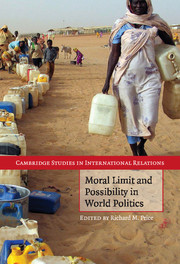Book contents
- Frontmatter
- Contents
- List of contributors
- Preface
- 1 Moral limit and possibility in world politics
- 2 Constructivism and the structure of ethical reasoning
- 3 The role of consequences, comparison and counterfactuals in constructivist ethical thought
- 4 Sovereignty, recognition and indigenous peoples
- 5 Policy hypocrisy or political compromise? Assessing the morality of US policy toward undocumented migrants
- 6 Lie to me: sanctions on Iraq, moral argument and the international politics of hypocrisy
- 7 Paradoxes in humanitarian intervention
- 8 Inevitable inequalities? Approaching gender equality and multiculturalism
- 9 Interstate community-building and the identity/difference predicament
- 10 Progress with a price
- Index
- Cambridge Studies in International Relations
- References
4 - Sovereignty, recognition and indigenous peoples
Published online by Cambridge University Press: 14 May 2010
- Frontmatter
- Contents
- List of contributors
- Preface
- 1 Moral limit and possibility in world politics
- 2 Constructivism and the structure of ethical reasoning
- 3 The role of consequences, comparison and counterfactuals in constructivist ethical thought
- 4 Sovereignty, recognition and indigenous peoples
- 5 Policy hypocrisy or political compromise? Assessing the morality of US policy toward undocumented migrants
- 6 Lie to me: sanctions on Iraq, moral argument and the international politics of hypocrisy
- 7 Paradoxes in humanitarian intervention
- 8 Inevitable inequalities? Approaching gender equality and multiculturalism
- 9 Interstate community-building and the identity/difference predicament
- 10 Progress with a price
- Index
- Cambridge Studies in International Relations
- References
Summary
Scholars of international relations have long studied the importance of the central institution of sovereignty, and how the practices and rules of mutual recognition have shaped the identities, interests and behaviours of states and constituted the international system itself. And yet, normative questions about what constitutes a just form of recognition in international politics have largely been pushed aside. Is it just, for instance, that only sovereign states are fully recognised under international law? Which actors should or should not be recognised in global politics and international law? How are different groups and agents mis-recognised or unrecognised? What are the consequences of such mis-recognition or non-recognition? And what can be done to promote more just forms of recognition?
In this chapter I propose to answer these questions as they apply to the particular case of indigenous peoples in world politics. The same system of international law that has promoted norms of sovereignty and human rights has also been complicit in European processes of conquest and colonialism. These processes have meant that only certain actors – the sovereign states of Europe and states that were recognised as sovereign over time by the original members of this exclusive club – have full recognition under international law. The self-governing political communities of indigenous peoples have never been incorporated or recognised in this system, even though they were self-governing prior to first contact and in most instances – despite overwhelming pressure from settler societies – these peoples have maintained a form of self-government down to this day.
- Type
- Chapter
- Information
- Moral Limit and Possibility in World Politics , pp. 112 - 137Publisher: Cambridge University PressPrint publication year: 2008
References
- 6
- Cited by



